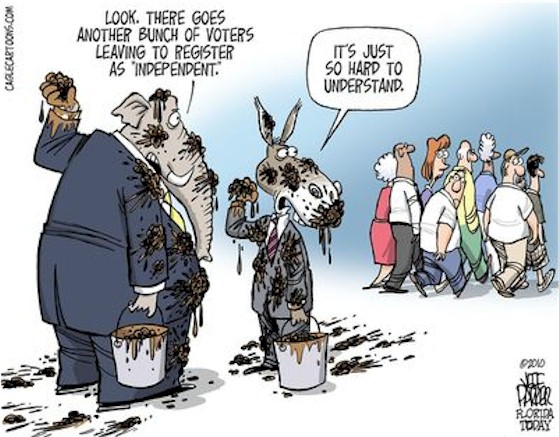
|
Why voting third party is not a wasted vote. Voting for an independent candidate is perceived by many uneducated voters as a "wasted vote" that will elect X or Y. However, this ignores a number of important factors, such as the electoral system, political culture, and personal beliefs. In a presidential election, choosing a third-party candidate over the major contenders—such as well-known figures like Trump and Biden—can be viewed as a calculated, moral, or ethical choice. The duopoly of two major parties has become a poison to the nation, as evidenced by the fact that neither party can now accurately represent its constituents, has failed to fulfill its sworn duty, and has grown complacent in its work. The party affiliation as of January 24, 2024, is as follows. Republicans made up 25% of the registered voters, Independents made up 45%, and Democrats made up 27%. In contrast, 30% of voters registered as Republicans, 38% as Independents, and 31% as Democrats in November 2020. In just four years, this represents a 5% loss for the Republicans and a 4% loss for the Democrats. The numbers are even more striking when you compare them to the last election, which Trump won in 2016. 34% of the affiliation was registered as a Republican, 28% as an Independent, and 38% as a Democrat in November of 2016. Thus, in eight years, Independents have cost the Republican Party 9% of its voters, while Democrats have lost 11%. How come the independents are gaining voters? The bottom line is that both parties have shifted their policies from their bases to the far left or the far right. It also has to do with their party leaders' morality and character. It is not difficult for people to accept that Trump was the lesser of two evils. More people detested Hillary than they did Trump. To garner enough votes to win, Trump also employed targeted advertisements to present narratives to voters in coveted districts. Take a look at the percentage of votes that separated Hillary from Trump in 2016. After four years of divisive media coverage, bombastic rhetoric, and witch hunts, Trump was more despised in 2022 than Biden. Examine the votes in the same districts once more—they were crucial in denying Trump the election. Once more, Biden won thanks to the narratives that the Democrats pushed to those swing districts. Thus, it appears that two incumbents are facing off against one another. However, Biden's attempt to serve as a unifier was unsuccessful, and Trump continues to promote his fabrications and lies. Ultimately, though, we are left with our choice of "Two Pison Bowls." Sadly, the parties have now driven the vast majority of people away from their shady politics and empire-building in Washington, DC, and the majority no longer wants to interact with either of the two parties. They are neither a Democrat nor a Republican, but they may still be Liberal or Conservative. For this reason, both parties promote the myth that supporting a third party equates to supporting the "Other guy" or that doing so will automatically undermine democracy. It's all just fear mongering. 65-73% of Americans want both Biden and Trump removed and do not want them to be in office. Because politics, in our opinion, is merely a huge grift and extremely divisive. Send out bulk emails claiming that the other side is the enemy and that you need to send money for me to defend you, demonizing them to the point of being the enemy. Trump spends $50 million of his donated funds on legal fees, demonstrating what his real concern is and that he does this after every court defeat or indictment proves it.
What is the ultimate goal of supporting a third party? It's easy, though, and we can use a case study that everyone has seen or experienced. Your child is a brat; they act rudely, are noisy, and won't do their chores. You can either punish them to make sure they understand what they are doing is wrong, or you can give them something in return for their bad behavior. If you don't provide a punishment, you're just encouraging their bad behavior and giving them no incentive to change. As a result, your child will grow up believing they can do whatever they want without suffering any repercussions. "I Could Shoot Someone, And I Wouldn't Lose Any Voters," was a statement made by Trump. Conversely, Bidens said, "You ain't black if you can't decide whether you support Trump or me." These are but two instances of the smugness the duopoly has instilled in us; it's time to let them know they are not in charge. Therefore, voting for a third-party candidate is the penalty for disregarding the interests of the electorate. demonstrating further that misbehavior will not be rewarded with a vote. Similar to how the Hispanic and African American communities have stopped supporting the Democrats despite more than 50 years of promises, these groups are still impoverished despite numerous promises made election after election. What more does vote for a candidate from a third party get us, then? Or what's the ultimate goal? for not endorsing either Biden or Trump. We can list the following as examples of alignment with personal values: Voting for a third-party candidate can be viewed as a moral choice if the voter finds that their positions and policies more closely match their own values and beliefs. Setting one's principles ahead of a candidate's perceived electability shows a dedication to upholding one's moral principles. Rejecting Lesser of Two Evils: Some voters might consider the candidates from both major parties to be incompetent or morally tainted. When such circumstances arise, supporting a third-party candidate is a means for them to reject what they consider to be the "lesser of two evils" and to stand by their moral principles. Encouraging Moral Policies: Supporting a third-party candidate can be viewed as a moral decision that aims to encourage positive social change if that candidate supports policies that are thought to be more just, compassionate, or ethical. Voting for a third-party candidate can be a means of expressing dissatisfaction with the status quo political system, indicating a desire for alternatives and a determination to end the two-party system. Long-Term Vision for Change: Voters may consider their selection to be a component of a long-term plan for political transformation. Through endorsing independent candidates, their aspiration is to effect a change in the political environment and eventually cultivate a more varied and inclusive democratic society. Expressing Beliefs and Values: Some voters decide to back independent candidates because they more strongly agree with their beliefs or as a means of voicing their displeasure with the major parties. These voters view the candidate's decision as a moral one, even if they may not win. Local vs. National Elections: Depending on the circumstances, independent candidates may be more successful in local or regional elections due to the distinct political environment and higher openness of the electorate to other options. Encouraging Alternative Ideas: Independent candidates frequently present alternative viewpoints and suggested policies. Supporting independent viewpoints that might not be offered by the two major parties can be accomplished by casting a ballot for a third-party candidate. Breaking the Two-Party Duopoly: One strategy to oppose the dominance of the two main political parties is to vote for a third-party candidate. It may inspire a more diverse political environment in the future by indicating to voters that they are willing to consider candidates who are not part of the mainstream Democratic and Republican parties. Voting on Principle: Some people place a higher priority on voting in accordance with their morals and beliefs than they do on the chance that a particular candidate will win. Regardless of the candidate's likelihood of winning, they think it is important to support a candidate whose opinions closely match their own. Creating Third-Party Momentum: Although it is difficult for a third-party candidate to win the presidency, some voters may view supporting third parties as a step toward creating momentum for upcoming elections. It might promote the development of outside parties and eventually broaden their sphere of influence. As you can see, not everyone can be answered succinctly when asked what the ultimate goal is. In my case, for example, the answer may vary depending on my morality and convictions. It was easier to bend down to someone than to fight, so I have never done so. I have faced off against the US government, the US states, and big businesses, and I have always prevailed. From that hill, I can look back and know that I did the right thing, not the easy one. However, I never have to wonder if I would just give in or if morality is on my side.
|
Copyright 2004-2024 United Sons Of Liberty Foundation All Rights Reserved.
